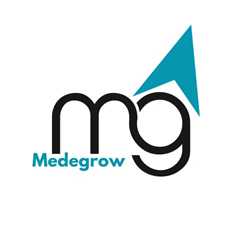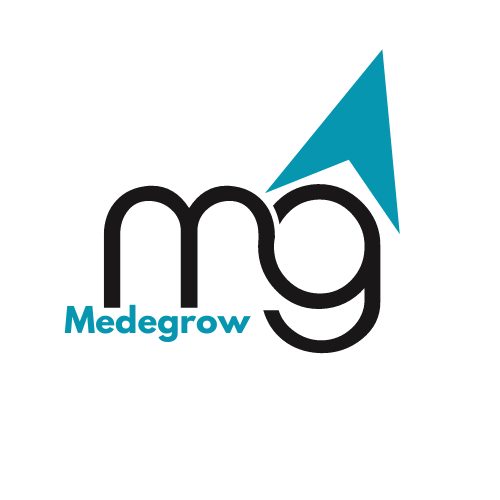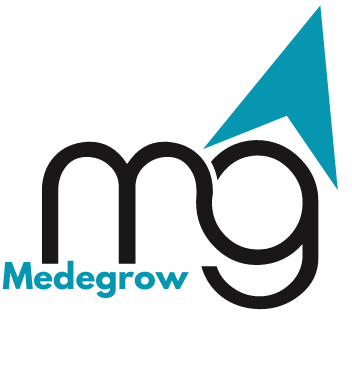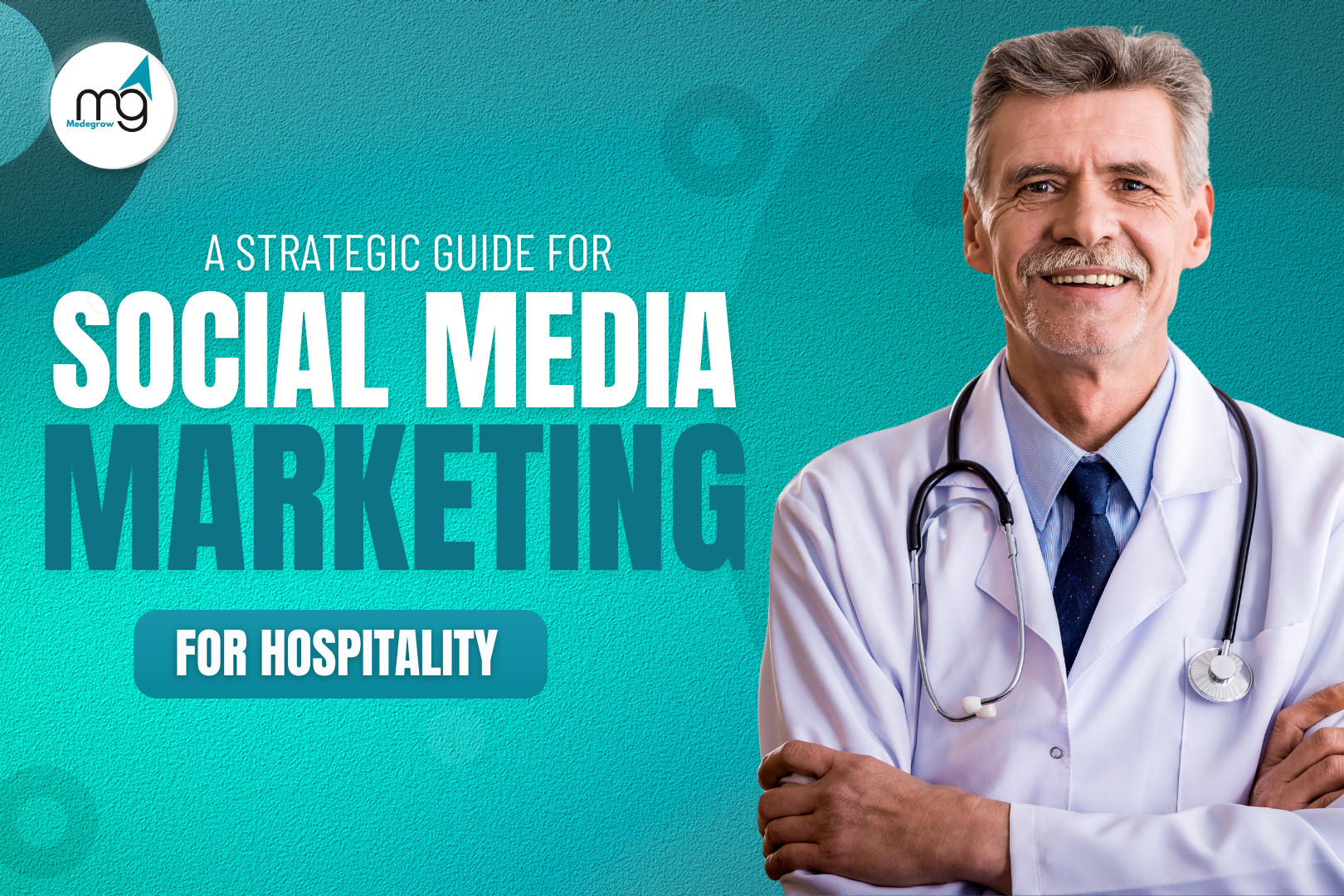
The Role of Social Media in Modern Healthcare Marketing
As digital transformation reshapes the healthcare industry, social media has emerged as a critical tool for connecting with patients, sharing valuable health information, and building brand credibility.
With millions of users accessing platforms daily, social media has enabled healthcare providers, from large hospital networks to small clinics, to reach patients in new and impactful ways. T
hrough social media marketing for hospitality and healthcare, providers can enhance patient trust, educate communities, and drive growth by positioning themselves as accessible, patient-centric organizations.
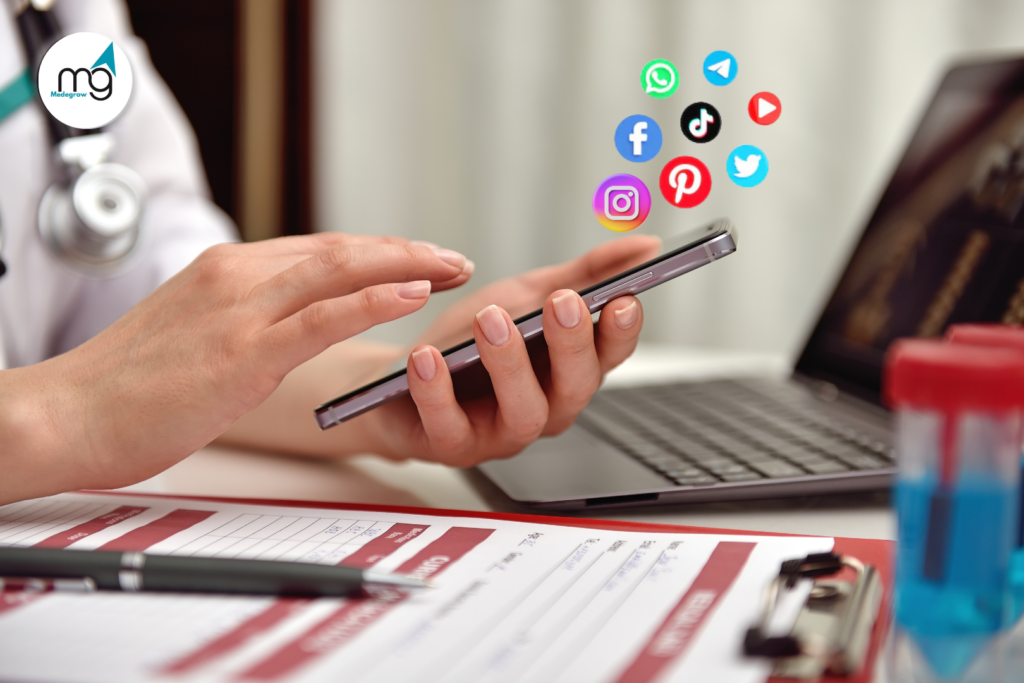
Establishing a strong presence on platforms like Facebook, Instagram, and LinkedIn is now essential to attract and retain patients, adapt to shifting patient behaviors, and stay competitive in a crowded market.
Why Social Media Marketing Matters for Hospitality & Healthcare
Social media marketing for hospitality and healthcare taps into their shared mission: providing excellent service and creating a positive, trust-building experience for clients or patients. While these sectors may seem unrelated at first glance, both rely heavily on reputation, word of mouth, and positive engagement to thrive.
Patients today, much like customers in the hospitality industry, seek transparency, convenience, and personalized service, and increasingly turn to online sources—driven by effective social media marketing for hospitality and healthcare—to make informed decisions about their healthcare and service providers.
- The Changing Face of Patient Behavior
- Current Trends in Social Media for Healthcare
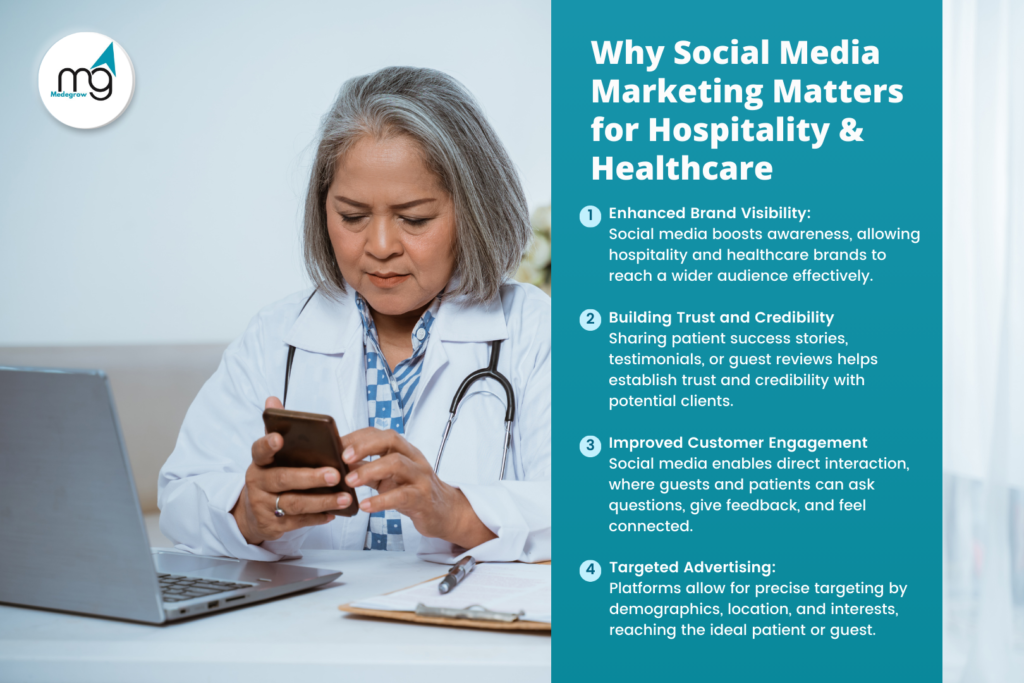
The Changing Face of Patient Behavior
Patients are now researching healthcare providers and treatments online, reading reviews, seeking peer experiences, and comparing options before making decisions. Social media has become an extension of this process, allowing patients to engage directly with healthcare providers, ask questions, and gain insights into what each provider offers.
With more people seeking healthcare solutions online, providers who have active social media presences can tap into this trend, meeting patients where they are and fostering trust in the process.
Current Trends in Social Media for Healthcare
Healthcare providers now face growing pressure to engage with patients online through effective social media marketing for hospitality and healthcare.
Trends such as the importance of online reviews, proactive patient engagement, and educational awareness campaigns are no longer optional; they’re crucial for maintaining a positive reputation and attracting patients.

Social media marketing for hospitality in healthcare goes beyond promotion—it’s about creating an open, welcoming channel that offers support, shares valuable content, and demonstrates empathy.
By actively engaging on social platforms, healthcare providers can distinguish themselves as trusted partners in patients’ health journeys.
Social Media Strategies for Healthcare and Hospitality Brands
Developing a targeted social media strategy is essential for healthcare brands looking to make an impact. Here’s how they can maximize their social media efforts, drawing parallels to effective social media marketing for hospitality:
- Build a Strong Online Presence
- Engage Through Valuable Content
- Focus on Patient Reviews and Testimonials
Build a Strong Online Presence
Healthcare brands should create and maintain profiles on relevant platforms like Instagram, Facebook, Twitter, and LinkedIn. Each platform has unique features, so it’s important to tailor content to each audience.
Consistent branding across platforms helps establish a recognizable presence, instilling confidence and making it easier for patients to engage. Maintaining a uniform logo, tone, and messaging ensures that patients can identify the brand instantly, which helps in building long-term trust.
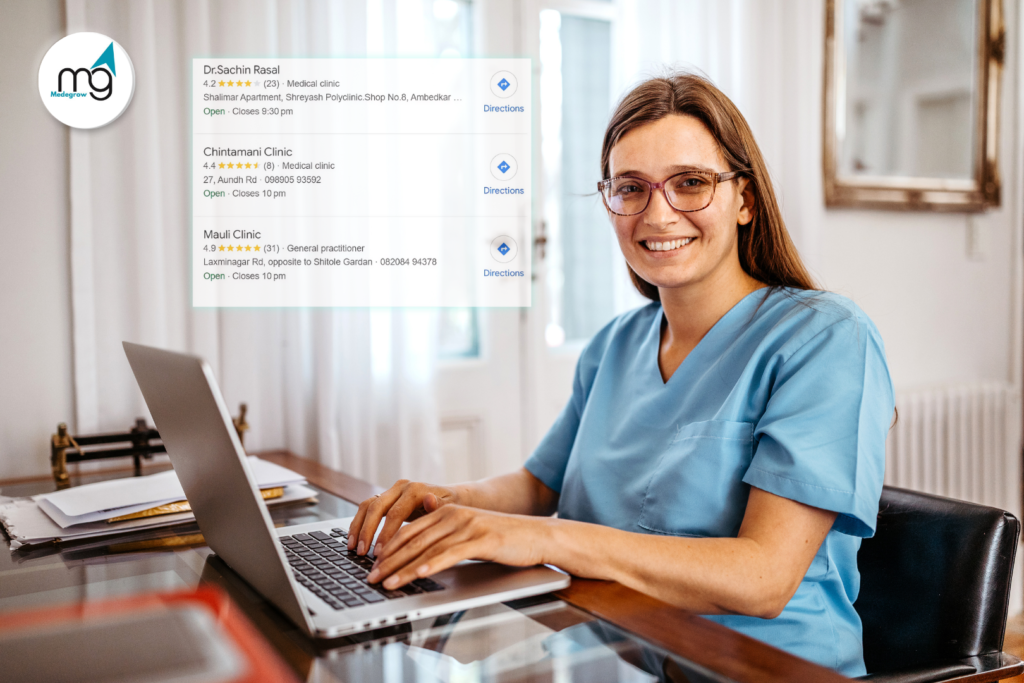
Engage Through Valuable Content
Content is the heart of social media engagement. Healthcare providers can use social platforms to share health tips, clinic updates, patient testimonials (with consent), and even behind-the-scenes insights into their day-to-day operations.
Content like infographics, carousels, short videos, and live Q&A sessions can boost engagement while making complex health information accessible and understandable.
Sharing visual content regularly can help establish a reputation for expertise and empathy, showing patients that the provider cares about their well-being beyond appointments.
This approach mirrors the successful social media marketing for hospitality, where visually appealing content enhances guest experiences and engagement.
Focus on Patient Reviews and Testimonials
Patient testimonials and reviews play an instrumental role in shaping public perception. Positive feedback is an endorsement of a provider’s quality of care and can make a strong impression on prospective patients.
Addressing negative reviews, on the other hand, demonstrates responsiveness and a commitment to improvement.
Encouraging patients to share their experiences and responding to feedback helps humanize the brand, giving patients a voice and showing that their opinions are valued, similar to the approach taken in social media marketing for hospitality.
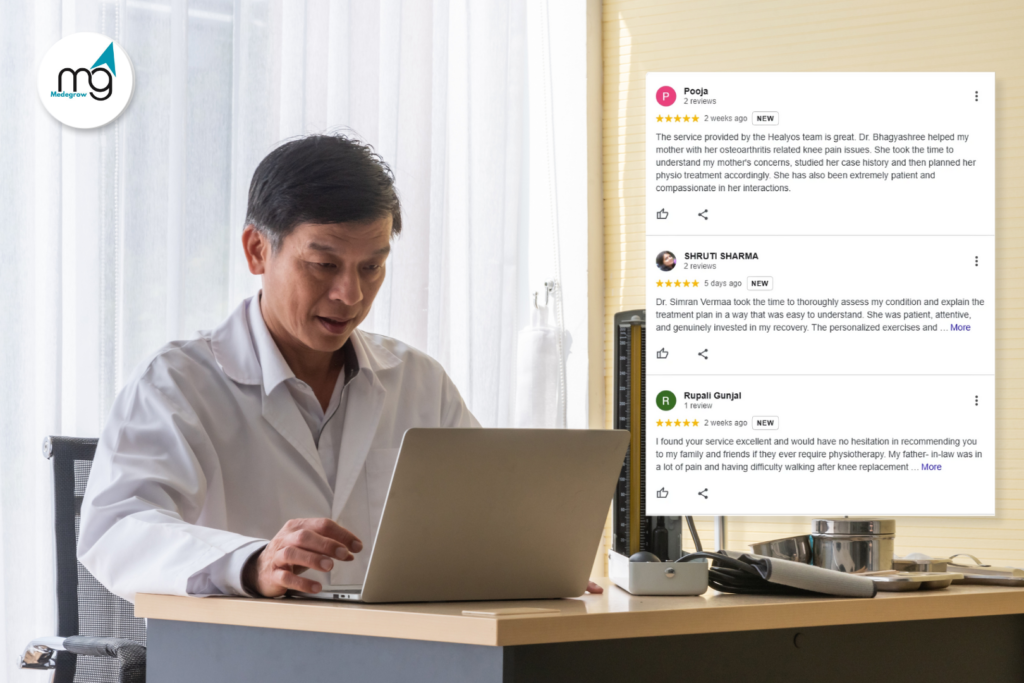
Best Platforms for Healthcare Social Media Marketing
Not all social media platforms are created equal, and choosing the right ones can amplify the impact of healthcare marketing efforts. Below are the platforms best suited for healthcare marketing and the types of content that resonate on each, drawing insights from social media marketing for hospitality.
- YouTube
Facebook – For Community Building and Event Promotions
Facebook provides an excellent opportunity for healthcare brands to build community connections and engage with local patients. It’s particularly useful for promoting events such as health fairs, wellness workshops, and vaccination drives.
Through posts, Facebook Groups, and events, healthcare providers can establish a community-centered approach, keeping patients informed and engaged, much like how hospitality brands engage with their clientele through event promotion.
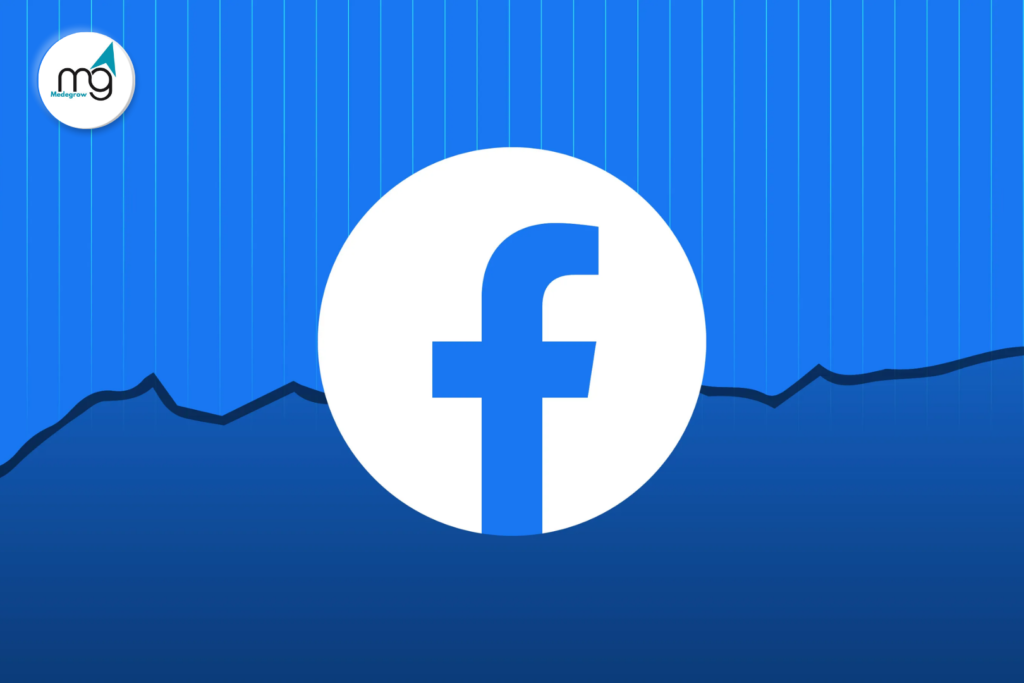
Instagram – Visual Storytelling through Posts, Reels, and Stories
Instagram’s focus on visuals makes it ideal for storytelling. Healthcare providers can post images of facilities, share patient success stories (with permission), highlight healthcare staff, and provide wellness tips.
Instagram Stories and Reels allow providers to give followers an inside look into the clinic environment, while carousel posts and infographics can be used to educate patients on health topics in an appealing, easy-to-understand format.
This strategy aligns with social media marketing for hospitality, where captivating imagery is key to attracting and retaining customers.
LinkedIn – Connect with Healthcare Professionals and Build B2B Relations
LinkedIn is well-suited for healthcare providers looking to connect with other professionals, collaborate with industry experts, and build B2B relationships.
They are sharing thought leadership content, including research findings, industry news, and expert articles, positions healthcare providers as knowledgeable leaders and trusted sources within their professional networks, paralleling the professional networking approach taken in social media marketing for hospitality
YouTube – Share Video Tutorials, Webinars, and Q&A Sessions
YouTube is the perfect platform for long-form content, such as educational videos, tutorials, and webinars. Providers can post Q&A sessions addressing frequently asked questions, step-by-step guides to preventive care, and discussions on trending health topics.
YouTube videos can also be embedded into blogs or shared across other social media platforms, extending their reach and providing a valuable resource for patients seeking detailed health information.
This mirrors the educational content strategies used in social media marketing for hospitality, where informative videos can enhance customer experience and loyalty.

How Social Media Improves Patient Experience and Business Growth
Social media is more than a marketing tool—it’s a means of enhancing patient experiences and promoting sustainable growth. Here’s how healthcare providers can use social media to drive positive change, much like successful strategies in social media marketing for hospitality:
- Patient-Centered Communication
- Health Education
- Increased Accessibility
- Stronger Referral Networks
- Community Engagement
Patient-Centered Communication
Social media allows healthcare providers to respond promptly to patient inquiries, whether they’re about appointment availability, treatment options, or general health advice.
This quick response time fosters trust and satisfaction, encouraging patients to view the provider as accessible and patient-centered, akin to how hospitality brands prioritize guest communication.

Health Education
Social media is a powerful platform for health education, empowering patients with the knowledge to make informed choices.
By sharing valuable content on preventive care, healthy lifestyle habits, and disease management, healthcare providers can contribute to better patient outcomes and cultivate a reputation as an informed and trustworthy source. This parallels the educational efforts in social media marketing for hospitality.
Also, read our another blog on Medical Marketing Trends for 2024 – stay ahead of the curve with the latest strategies to elevate your practice this year
Increased Accessibility
Social media provides patients with a communication channel outside of office hours, allowing them to stay connected with healthcare providers at their convenience.
Through direct messaging and comments, patients can ask questions, receive updates, and feel more involved in their healthcare journey, similar to the accessible service offerings that hospitality brands strive to provide.
Stronger Referral Networks
Social media facilitates professional connections within the healthcare community, fostering cross-referrals and collaborative opportunities.
For instance, a primary care provider might connect with specialists or physical therapists on LinkedIn, creating referral relationships that benefit both providers and patients, just as hospitality professionals may network for mutual referrals.

Community Engagement
Participating in public health campaigns and awareness days shows a commitment to community well-being. Social media is a great space for healthcare providers to educate the public on issues like mental health, preventive care, and lifestyle diseases.
Community involvement solidifies the provider’s position as an advocate for public health and a trusted partner in the community, echoing the engagement strategies found in social media marketing for hospitality.
Overcoming Barriers to Effective Social Media Marketing
Despite its benefits, social media marketing comes with challenges that healthcare providers must navigate carefully.
- Regulatory Compliance
- Maintaining Professionalism
- Resource Constraints
- Handling Crisis Situations
Regulatory Compliance
Healthcare providers must comply with HIPAA or other local privacy regulations to protect patient confidentiality.
Training staff on social media compliance, obtaining necessary consents, and setting up a review process for posts can mitigate the risk of breaches, just as hospitality brands must adhere to industry regulations regarding customer data.
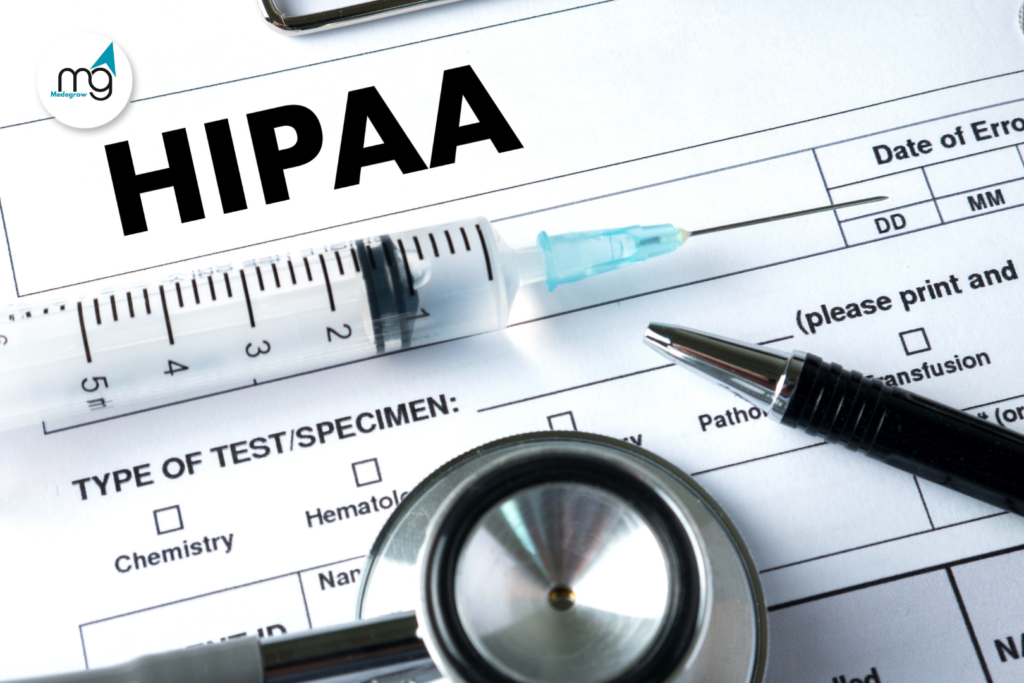
Maintaining Professionalism
Balancing a friendly online presence with professionalism can be challenging, but using templates, following a content calendar, and developing clear brand guidelines can ensure consistency and appropriateness in messaging, which is also crucial in social media marketing for hospitality.
Resource Constraints
Managing social media requires time, expertise, and consistency, which can be difficult for small clinics or busy practices. Outsourcing social media management to experienced professionals or using scheduling tools can alleviate these constraints while maintaining an active presence.
Handling Crisis Situations
In healthcare, addressing negative reviews and complaints professionally is critical. Having a crisis communication plan in place, being prepared to respond politely, and following up with solutions shows patients that the provider is attentive and dedicated to improvement, similar to best practices in crisis management in social media marketing for hospitality.
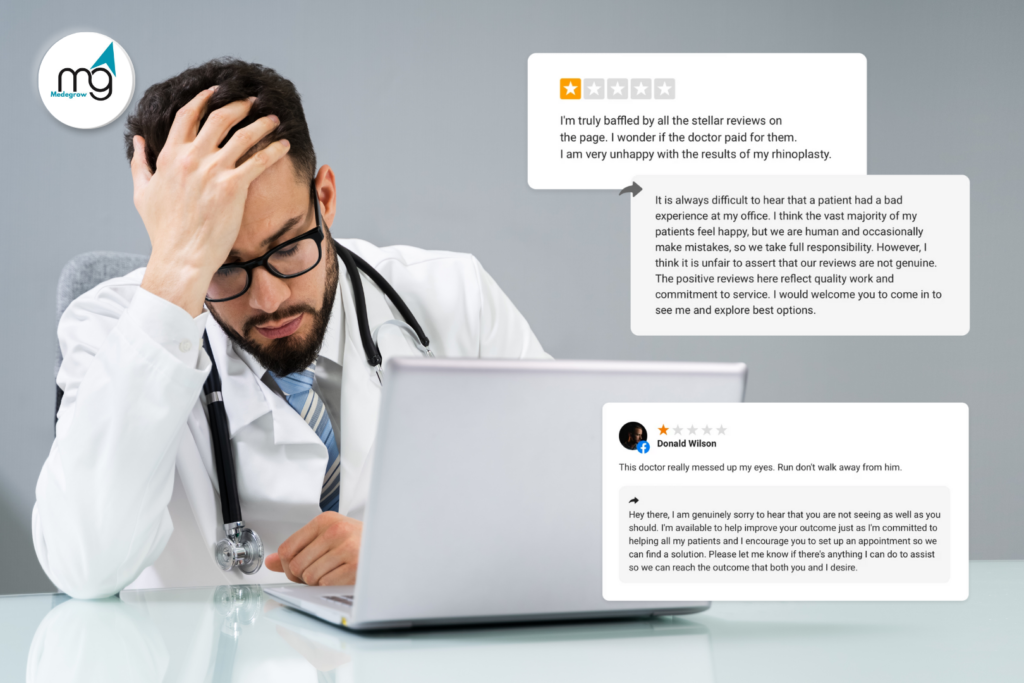
How to Measure the Success of Social Media Campaigns
To ensure social media efforts are delivering results, healthcare providers should track relevant metrics.
Key Performance Indicators (KPIs)
Setting clear KPIs helps providers understand the impact of their social media marketing for hospitality. Key metrics include:
- Engagement Rate: Measures likes, shares, and comments on posts, indicating how well content resonates with the audience.
- Reach and Impressions: Tracks how many users see posts, providing insights into brand visibility.
- Conversion Rates: Monitors actions taken by users, such as booking appointments or signing up for newsletters, as a result of social media interactions.
- Follower Growth: Assesses the increase in followers over time, reflecting the brand’s growing influence.
- Sentiment Analysis: Analyzes the tone of comments and messages to gauge patient perception and satisfaction.
Analyzing Data
Regularly analyzing data helps identify trends and adjust strategies. Providers can assess what content performs best, what times generate the most engagement, and which platforms yield the highest return on investment (ROI).
Adapting based on this analysis mirrors the iterative approach used in social media marketing for hospitality, where performance data is leveraged for continuous improvement.

The Future of Social Media Marketing in Healthcare
Social media marketing for hospitality and healthcare will continue to play a pivotal role, enabling providers to build patient relationships, establish trust, and offer value beyond clinical care.
Adopting a patient-centered approach, sharing valuable content, and maintaining professionalism are essential to successfully leveraging social media marketing for hospitality and healthcare.
By integrating targeted social media strategies into their marketing efforts, healthcare providers and hospitality businesses can create a powerful digital presence that resonates with patients and clients, builds community trust, and drives growth in a competitive industry.
In conclusion, the relevance of social media marketing for hospitality and healthcare cannot be understated. Both sectors must prioritize engaging, informative, and responsive content to foster relationships that lead to patient loyalty and brand advocacy.
As healthcare continues to evolve, those providers who effectively leverage social media will be positioned for success in delivering exceptional patient care.
FAQs on Social Media Marketing for Hospitality and Healthcare
How can social media help in building patient trust?
Sharing educational content, patient testimonials, and behind-the-scenes stories can increase transparency and help establish trust.
Which social media platforms are best for healthcare marketing?
Platforms like Facebook, Instagram, LinkedIn, and YouTube are effective for reaching and engaging diverse healthcare audiences.
How should healthcare businesses handle negative comments on social media?
It’s best to respond politely, acknowledge the concern, offer solutions, and, when appropriate, move the conversation offline to resolve the issue privately.
Is it necessary to run paid ads for healthcare on social media?
While organic reach is valuable, running paid ads can significantly enhance visibility and attract more leads in a shorter time.
How can social media help with patient retention?
By sharing engaging content, maintaining regular communication, and providing personalized responses, healthcare brands can foster stronger connections with patients.
